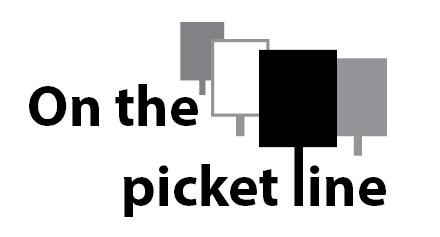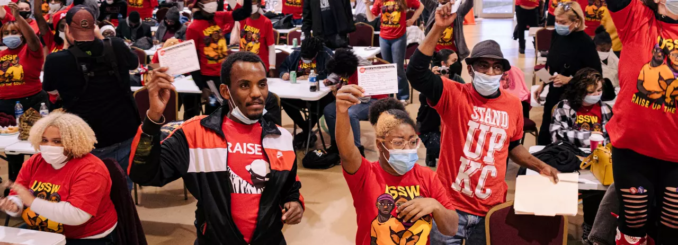On the Picket Line

New union wants to raise up Southern workers
A new generation of labor activists has formed the Union of Southern Service Workers (USSW). The union will work to organize the most oppressed, underpaid and exploited workers in service industries, like fast food, retail and home care; the majority are Black and Brown workers. USSW intends to build its membership across all service industries, from McDonald’s and Freddy’s Frozen Custard and Steakburgers (where workers led successful walkouts during the pandemic) to Walmart and Dollar General.

Workers celebrate as they vote the Union of Southern Service Workers into existence, Columbia, South Carolina, Nov. 19. Credit: USSW
The Bureau of Labor Statistics reports only 5% of workers in the U.S. South belong to a union. Bosses in the South have had a long history of creating racist divisions among workers to defeat their solidarity. But the 150 co-founders of the USSW are drawing inspiration from the Fight for $15 campaign and the tremendous surge in labor power across the U.S. since the COVID-19 pandemic. USSW grew out of the work of Raise Up for $15, the Fight for $15 organization in the South.
Service workers’ collective consciousness was raised with the realization that despite being “essential” frontline workers, they had some of the lowest quality of life in their communities. USSW founding member, Quadtrell Adams, has worked in fast-food restaurants for years, but, because of abysmal monetary compensation, he must ration his seizure medications and rely on family for a place to live.
The union wants to elevate demands for higher wages, safety protections and consistent schedules to the status of human rights for a living wage, housing and health care.
Durham, North Carolina, labor organizer Ieisha Franceis was part of the labor actions at Freddy’s. She was hesitant at first to challenge the bosses but has grown with the realization that workers have power. According to Franceis, “USSW will give us the representation we need to transform these jobs that most people frown upon into high-paying union jobs. That’s going to give us a new sense of dignity.” (tinyurl.com/2rtp85u6)
Harm-reduction center workers resist capitalist abuses
Workers at OnPoint NYC, an overdose prevention center, have submitted a demand for voluntary recognition of their union, OnPoint United. The center provides a safe environment and supplies to drug users, along with opportunities to receive other services, including comprehensive medical care.
The workers come from a broad range of backgrounds, including the formerly incarcerated. They have witnessed the catastrophic fallout the U.S. War on Drugs has had on communities, especially on poor and marginalized Black and Brown people.
OnPoint United is demanding better health care and more decision-making power in the workplace. They have seen how the profit-driven privatization of treatment centers like OnPoint NYC has intensified the defects of capitalism. As physician Michael Pappas states: “There’s an interesting relationship here, as the services OnPoint NYC provides are useful to the capitalist system in a way, because it’s ideal for the ruling class to keep the end result of capitalism — poverty, homelessness, psychological suffering, etc. — out of the public eye for the ongoing facilitation of private accumulation under the system.
“At the same time, by [workers] treating people using drugs with love, compassion and respect and demanding they are treated like humans, we can fight to show that our participants, along with the public generally, deserve a system better than capitalism.” (tinyurl.com/538ucpt7)
NewsGuild members stage 24-hour walkout, urge reader boycott
It was in 1965 when newsroom workers, members of the New York Times Guild union, last shut down the New York Times; that strike lasted 24 days. On Dec. 8, 1,100 Times workers, members of the NewsGuild of New York (part of The Newspaper Guild-CWA), made history once again by staging a 24-hour walkout to protest management’s failure to meet their contract demands. The workers also called on the general public to boycott both the print and digital versions of the New York Times for that day.
Workers haven’t had a pay raise since 2020, despite the paper increasing its paid subscribership and reporting record profits. The recent 30% hike in pay for executives certainly made the rank and file see red ink. The bosses’ disregard was right there in black and white. (nyguild.org/, Dec. 7)

